Ice cold lemonade on a warm sunny day can be one of the most enjoyable moments in an otherwise complex world. This is often the concept that comes up for me when thinking about great summertime drinks and refreshing moments of bliss created by what is notoriously sour.
On April 23, 2016, Beyoncé released her video album, Lemonade. Not only did she capitalize on that analogy, but she also used an intense combination of imagery, music, poetry, and Black Girl Magic to do it. The hour long video premiered on HBO for 24 hours, showcasing the incredible musicality of one of today’s largest and fiercest performers.
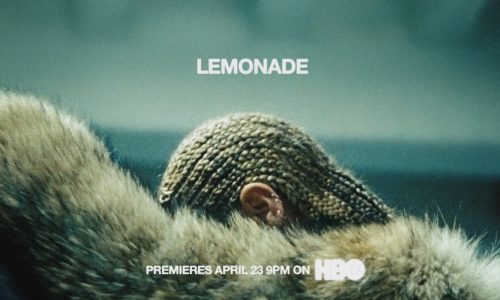
However, the video did much more than that. Images of Black women flooded the screen; magnetic poetry from Warsan Shire transitioned us from scene to scene, as Beyoncé told a story of womanhood and recovery through her songs. Not only did the screen light up with images of the rural deep south, there were also beautiful faces of Black women painted with the tribal artwork of South African artist Laolu Senbajo. Serena Williams used her strong powerful body to dance in her feminine embodiment, and the sisters of Ibeyi and actress Zendaya made an appearance on the video alongside Beyoncé.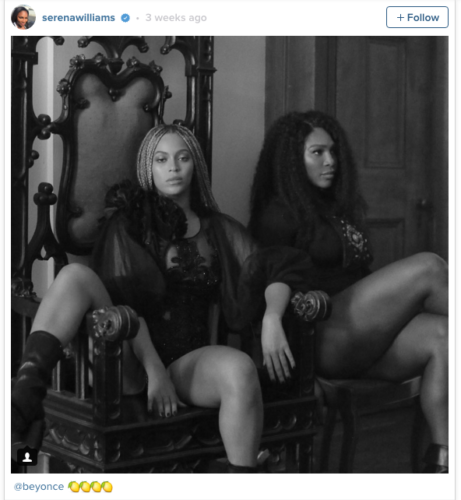
Lemonade tells the story of a strong woman walking through the stages of hurt, grief, and recovery, while healing from infidelity within her relationship. There were 11 stages in the process outlined in the video: Intuition, Denial, Anger, Apathy, Emptiness, Accountability, Reformation, Forgiveness, Resurrection, Hope, and Redemption. With each segment the video shows an intense and personal process to which many people can relate as they cope with a cheating spouse, and with the experience of womanhood.
But was this video just about a cheating husband? Through the piece, Beyoncé created a complex piece of art by layering on the experiences of the personal, political and cultural within one snapshot. Is it about Black women and empowerment? Is it about a political agenda? Or is it about the power and magic of Blackness?
Freja Dam appropriately and eloquently responds to this topic in a piece on Spin.com. She wrote, “On first listen, Beyoncé’s new album Lemonade is all about Jay Z’s cheating. But the 65-minute film accompanying the music makes the personal political by visually empowering black women, celebrating Deep Southern culture, and referencing the Black Lives Matter movement, Malcolm X, and Hurricane Katrina. Beyoncé is not just a single woman scorned — she represents a scorned demographic, or as the film directly quotes Malcolm X: ‘The most neglected person in America is the black woman.’ ”
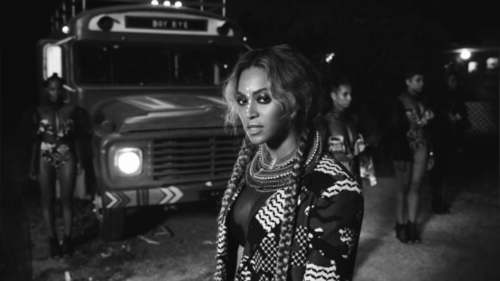
[Video Still]
In exploring the intense connection felt by many in response to the release of Queen Bey’s latest work, I started to take note of article after article highlighting the same observations that I had made. Opinion pieces, Lemonade reading lists, and interviews started popping up everywhere. And while all of the circulating pieces were not favorable toward Beyonce, Lemonade, and the hype, many correlations were being made about the impact of this work and the implications of Black women and their magic.
I was not expecting to be cracked wide open by this project. I was not expecting to shed a lifetime of tears. But I did. Lemonade is about so much more than one relationship and its infidelity. Lemonade is about the love that black women have – the love that threatens to kill us, makes us crazy and makes us stronger than we should ever have to be. – Ijeoma Oluo, The Guardian
Beyoncé’s Lemonade is grown-ass black woman magic. And the lemons that Queen Bey is working with, powerful hoodoo ingredients for overpowering bad energy, are clearly the Louisiana kind. Lush, troubling visuals show that Beyoncé is the goddess, the goddess is furious, the goddess is victorious, and most important: The goddess is every black woman. Slay. – Omise’eke Natasha Tinsley, Time magazine
This latest work of art by Queen Bey essentially ends silences around many aspects of our culture, centering black women and potentially daring to acknowledge neglected spiritual practices that have femme deities. What a time to be alive. – Amanda Alcantara, Remezcla
Every Black woman in Lemonade has been robbed of something. Every Black girl, too. And they are owed accountability. They are owed healing. They are owed more than what the world has granted them. Lemonade sends the message that we must be vocal about this. We must not assist the world in erasing our suffering. We must honor ourselves. We must perform magic tricks. We must pull ourselves out of our own bones and help ourselves along. We must find communion in our reflections in each other. We must say: I see us. – Dominique Matti, Medium
Mainstream reflections of powerful Black women have always been problematic in our culture. We are more likely to see images of the “angry” black woman, the hyper-sexualized black woman, or the welfare queen than those who humanize our complex experiences and highlight our survival in alignment with hundreds of years of power, spirituality and healing.
I have personally struggled with the disconnect between the magic of my people and the magic taught to me through modern Paganism. There seems to be little room within our community to explore, or often to acknowledge, that the magic of Black women has a rich lineage that is enmeshed with the struggle and survival of our people. Black women have continue, through time, to use our stories, our folk remedies, our lineage and our pure existence as a way to enhance and manifest magic throughout time. It has often been the medicine to our ailment, the way that we conjure faith, and the opportunity to shift our reality toward mental and physical survival.
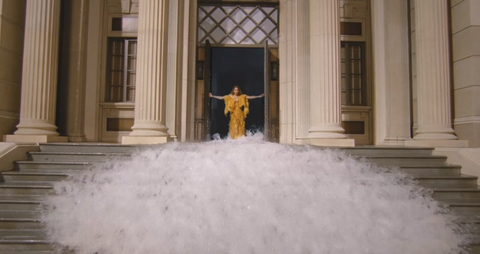
[Video Still]
While many have been able to connect with the intersecting spiritual messages throughout Lemonade, what kind of impact has it had on the Modern magical communities? On Black women within our community? On the culture of Blackness our current times?
I reached out to a few Black women within the modern Pagan, Polytheist and African Diasporic Religions to see what their thoughts were on these very topics.
![[Video Still]](https://wildhunt.org/wp-content/uploads/2016/05/beyonce-lemonade-visual-album-still-1-fuse.com_-500x261.jpg)
[Video Still]
Let’s talk about Beyonce’s offering in Lemonade, or as I refer to her energetic reality shifting super-self, Our Lady of Unapologetic Blackness. She has really sparked a fire under some of us due to the phenomenal imagery and historical inside references in this work. Specifically, some of the Witches and Magickians in the Diaspora found a “moment” in this that resonated not just on the sociopolitical level, but on the soul deep level of being a Black woman in magick.
In her archetypical representations of the female experience she elicits the more complete gnosis of the Goddess and the Story we live as her images on earth. The detail of human experience, the mother wit, the sheer raw grit and tears and joy of it all, are an empowering and heady mix. Despite the attacks and dismissive diminishing of her motivations, this new veil rending into her maturing role as a voice in the continuum of our artistic experience is powerful.
How many of us have had those moments when we reach that wall of shared ancestral and current experience when we try to share our Black Magick with others? She pushes that soda pop punchline political pandering of our assimilationalist Sisters in Black and gave us a good swift kick in the skirt ruffle. Her video primer on being ourselves in our own skin motivated countless diasporic Witches to become more visible.
I could dissect the imagery to death, and still not touch on the impact that it had on many of us. The thrill of seeing that parlor with all these powerful women. The nod to the transcendence beyond the petty colorism. The bold embrace of the right to anger, sexuality, and emotional agency are blazing through my blood.
And sorry, bell hooks, I admire you but you need to put the machete down a second. If James Brown could write that he could say it loud that he was Black and proud, why can’t Beyonce? This is a new time and generation, and thus new entertainers say it their way. I really have a scored bone to pick with this constant criticism of her using her talent to be successful. I am no member of the Bey Hive, but I can tell when an artist aspires to be more than what she is thought to be. I find it odious and offensive that she be belittled and denied her journey of actualization because she is not doing “feminism” like you think she should.
The markings on the faces of the women in the bus were hitting too close for me. These are very close to what is used in my practices when I am alone. The white dresses for rebirth and death of the self, the yellow for what many suspect was a nod to Oshun, and the anger of the parking garage represented every vengeful goddess story. These images fed me. They fed my soul in a similar way that I am sustained when I am quickened in ritual. And finally, I have to get one of those sharp ass hats. Elizabeth Ruth said it best when she said we need to step up our Witch fashion game. Seriously, my ritual closet needs to get in formation.
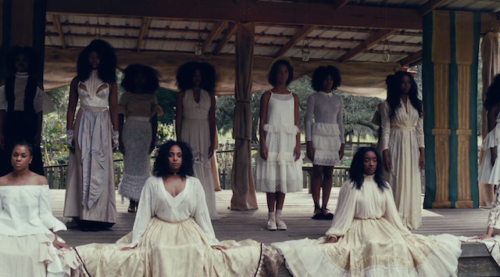
[Video Still]
Lemonade was affirming for Black Girl Magic culture in that it offered a popular and empowering face to what has traditionally been something that was hidden. Suddenly those who were dabbling in African spiritual traditions felt like…”if Beyonce” is not afraid to put her practice out, I can too.” I don’t know if it did much for me as I was already there. It did cause my phone to blow up though…because everyone had questions and wanted to know more.
The images that were most spiritually empowering for me were those involving the irunmole..primordial power, Ọṣun. Ọṣun is well loved and known all over the world and represents self esteem, self value. A lot of people focus on Ọṣun as beauty and sweetness, but they don’t know that Ọṣun is the epitome of women’s power and might. So much of the video touched on things many women go through… In relationships … We hurt, we cry, we transform, we are reborn, we rise, we trample under foot, we forgive, and we love … Ọṣun teaches us about relationships…and merging that with the video, it offers some healing magic through the process of relationship. It says … feel a thing, but don’t get stuck, own your power, use i t… And stand tall. That is Ọṣun.She speak of many things those who are initiated in the tradition go through. Initiation is a death and resurrection process. Everything means something…and old you dies … A new you is born … Of blood and stone, of power and spirit … You are protected as a child and nurtured through that process. That is what she is describing as she goes under water. Anyone who initiated knows what all of it means because we all went through it.
Tanisia Greer said:
Water. That was the biggest through-theme I took away from Beyoncé ’s “Lemonade” visual album.
Water is life and death. It can wash away dirt and “sins”, and can suffocate and drown. It can give life and take away life. Grow plants and people, and break down the biggest mountain over time. And in the most breathtaking (literally) sequence in the Lemonade film, Beyoncé acted out, in a dreamy underwater sequence, the similar suffocation that some women go through to make themselves small in life. Not just in relationships, but in society itself. And that happens to Black women more than most –holding our breath, holding in our essence so as to not disturb other people’s conceptions of our existence. To stop our breath, to make ourselves still and silent, and to drown ourselves, if necessary, in order to appease other people.
When Beyoncé emerged from that building, water gushing out, that felt like a vicarious birthing sequence, a baptism and a cleansing in more ways than one. Being set free to express the fullness of herself, and myself by implication. (I could wax poetic about her epic “Hold Up” destruction sequence,but that’s a whole ‘nother delicious subject to get into. To express joy in finally owning and expressing that righteous fury like a tsunami, but I digress.)
The entire Lemonade movie was magical. There were the obvious tribal cues – the face paintings and tattoos, the signaling of the Orishas (Oshun of the Sweet Waters, most of all), invoking of divine sisterhood and claiming of woman power writ large. And that theme was carried over into her Formation Tour, which I was blessed to attend on Monday night in Santa Clara, at Levi’s Stadium. That’s where the magic came to life for me.
Near the end of the show, the foot of the catwalk filled with water. And she and her crew slowly glided toward the platform on the catwalk conveyer belt. And they performed three dramatic numbers, splashing through the water, stomping and ululating into the night. And when they were finished, the concertgoers around the foot of the platform were treated to Beyoncé playfully splashing them from the stage. A sort of baptism that I felt even from my lofty perch. Her joy. Giving joy to us.
Joy and permission to love ourselves. That’s the magic that I’ve carried from being exposed to Lemonade. That’s been her consistent message throughout her tour, from Lemonade, and possible throughout her career.
Beyoncé has become my new muse. She and Lemonade have rekindled my inspiration fire and reminded myself that I’m the most important person in my world. If I’m not happy, I can’t be there for anyone else. She also reminded me to revel in my womanhood – my Black womanhood, specifically. To be unapologetically “Black” and proud of my roots.
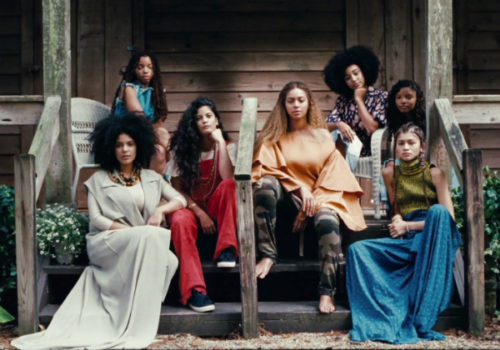
[Video Still]
The layers of the political, spiritual and magical, which are all demonstrated in Beyoncé’s Lemonade, show a clear correlation with the everyday path of Black women all over the world. Embracing the #BlackGirlMagic in our circles and communities only enhances our collective power in society.
If you haven’t seen it yet….Maybe you should get in Formation.
* * *
This column was made possible by the generous support of the members of Come As You Are (CAYA) Coven, an eclectic, open, drop-in Pagan community in the San Francisco Bay Area.
The Wild Hunt is not responsible for links to external content.
To join a conversation on this post:
Visit our The Wild Hunt subreddit! Point your favorite browser to https://www.reddit.com/r/The_Wild_Hunt_News/, then click “JOIN”. Make sure to click the bell, too, to be notified of new articles posted to our subreddit.
Excellent article! 🙂
Thank you for this, Crystal. 🙂
The face paint in “Sorry” is by a Nigerian artist, not South African.
Nothing wrong with letting Black Women empower themselves and tell their side of the story. I hope we see a lot more of it.